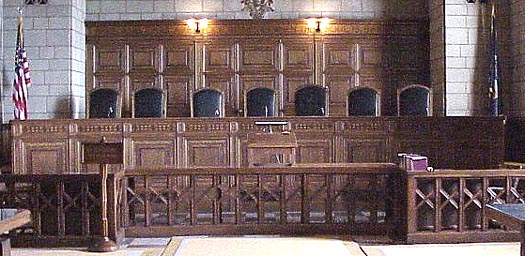Indianapolis, Indiana – Citing the recent U.S. Supreme Court decision in Gunn v. Minton, the  Southern District of Indiana has remanded to the Marion Superior Court the legal malpractice lawsuit filed by the Indiana patent lawyer for Miller Veneers, Inc. The Defendants in the case are Indiana patent attorney Clifford W. Browning as well as two Indiana law firms, Krieg DeVault, LLP and Woodard, Emhardt, Moriarty, McNett & Henry, LLP.
Southern District of Indiana has remanded to the Marion Superior Court the legal malpractice lawsuit filed by the Indiana patent lawyer for Miller Veneers, Inc. The Defendants in the case are Indiana patent attorney Clifford W. Browning as well as two Indiana law firms, Krieg DeVault, LLP and Woodard, Emhardt, Moriarty, McNett & Henry, LLP.
In September 2012, Miller Veneers sued Clifford W. Browning; Krieg DeVault; and Woodard, Emhardt, Moriarty, McNett & Henry in Marion Superior Court alleging attorney malpractice regarding the acquisition of patents. Defendants removed the case to the Southern District of Indiana in October 2012, asserting federal question jurisdiction and 28 U.S.C. § 1338(a) (2008).
Although the court originally found that it had subject matter jurisdiction under 28 U.S.C. § 1338(a), the Supreme Court’s recent decision in Gunn v. Minton led the court to reconsider the question of federal jurisdiction and to conclude that it did not, in fact, have subject matter jurisdiction over the suit, despite that the legal malpractice claims were based on underlying patent matters.
According to the new standard set forth in Gunn, federal jurisdiction exists over state law claims “if a federal issue is (1) necessarily raised, (2) actually disputed, (3) substantial, and (4) capable of resolution in federal court without disrupting the federal-state balance approved by Congress.”
While the issues of federal law in this malpractice lawsuit were found to meet the first two prongs, the court held that they failed the second two prongs. Specifically, the third Gunn prong requires that the issue be “substantial,” which requires the court “to look to the importance of the issue to the federal system as a whole.” The court held that, as was the case in Gunn, this issue was not important to the federal system as a whole but merely to the parties. The court also held that the fourth prong had not met. It stated that, where issues such as malpractice are to be litigated, the balance is in favor of the states as they have “a special responsibility for maintaining standards among members of the licensed professions.”
The court, upon determining that it lacked jurisdiction under the standard set forth in Gunn, remanded the matter to the Marion Superior Court.
Practice Tip: In Gunn, the Supreme Court held that a legal malpractice claim pertaining to the handling of a patent infringement case did not afford jurisdiction under 28 U.S.C. § 1338(a), stating, “We are comfortable concluding that state legal malpractice claims based on underlying patent matters will rarely, if ever, arise under federal patent law for purposes of § 1338(a).”
This complaint was filed by Ronald J. Waicukauski. The case was assigned to District Judge Richard L. Young and Magistrate Judge Tim A. Baker in Southern District of Indiana and assigned Case No. 1:12-cv-01455-RLY-TAB. The case originated in Marion County Superior Court 5, Case No. 49D05-1209-CT-035371.
 Indiana Intellectual Property Law News
Indiana Intellectual Property Law News

